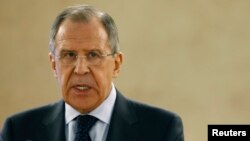Russia this week is for the first time hosting talks with the main Syrian opposition group, the Syrian National Coalition, as part of a push for dialogue with Damascus.
The meetings are a step forward in Moscow's efforts to mediate an end to the four-and-a half-year conflict.
The Syrian National Coalition (SNC) boycotted Russia-hosted talks in February and April, which failed to make progress.
But the SNC believes the Kremlin has softened its support for Syrian President Bashar al-Assad.
Reassessment underway
Russian political analysts say rebels and jihadists have weakened the Syrian leader, forcing Moscow to reassess its position.
“I think that Moscow, at its heart, accepted as positive fact the end of the Assad's regime and is trying to save all that may be saved after the collapse,” said commentator Geydar Dzhemal, chairman of the Islamic Committee of Russia.
The presidents of Turkey and the United States also recently suggested the Kremlin has shifted its stance on Syria.
Turkish President Recep Tayyip Erdogan said Russia may give up on Assad. President Barack Obama said both Russia and Iran had revised their attitudes toward the Assad regime.
Russia last week dropped its long-standing opposition to a United Nations investigation into a deadly chemical weapons attack in Syria. The U.N. resolution seeks to assign blame for the 2013 sarin attack that killed hundreds in a Damascus suburb.
Syrian government forces are widely suspected of having carried out the attack, which led to a Russia-U.S. that destroyed Syria's chemical weapons stocks under international monitoring.
Changing situation
“Officially, Moscow has not rejected unwavering support for the Damascus government,” said Alexander Shumilin, head of the Center for Analysis of Middle East Conflicts at the Institute for U.S. and Canada Studies in Moscow. “But the situation around Syria is changing now, and Moscow is trying to adapt to this new, emerging situation."
Shumilin said the Iran nuclear agreement helped spur the Kremlin to shift away from Damascus. He said Moscow fears being sidelined if Tehran, Syria's main ally in the region, helped broker a peace deal. “Many people on the top in Russia do...have suspicion[s] that Iran could turn more and more to the West,” Shumilin said.
But Russian officials deny they have backed away from supporting the Syrian president and say a consensus is emerging that fighting Islamic State terrorists is more important.
Russian Foreign Minister Sergei Lavrov on Tuesday warned against using military means for regime change in Syria.
"The talks are about ... coordinating all those who are already fighting terrorists so that they put their main focus on fighting terrorism,” he said, “and leave for later settling scores between themselves."
Lavrov spoke after meeting in Moscow with his Saudi counterpart, Adel al-Jubeir, who agreed on the need for dialogue, but Jubeir put the blame squarely on the Syrian president.
"A key reason behind the emergence of Islamic State was the actions of Assad, who directed his arms at his nation, not Islamic State," said Jubeir.
Deadly bombings
Human Rights Watch reports Damascus has killed more civilians than Islamic State with barrel-bombing campaigns that drive locals to support the extremists.
Russia fears religious extremists would emerge the winner if Assad's government were to fall. Several thousand Russian citizens are fighting on the rebel side, and they could take up arms at home over Moscow's support for Damascus.
“Russian interest in Syria is to keep the secular regime in Syria. But, who will be president, Bashar Al-Assad or another one, is not very important," said Boris Dolgov with the Institute of Oriental Studies at the Russian Academy of Sciences.
A flurry of diplomatic activity preceded the talks in Moscow, including the first three-way meeting on Syria between the top Russian, Saudi, and U.S. diplomats.
Riyadh and Washington, along with Ankara, have been backing efforts to see Assad removed from power.
The U.S. is leading a multinational coalition in air strikes on Islamic State positions in Iraq and Syria that Russian officials argue will have limited effectiveness.
Lavrov on Tuesday also downplayed the significance of the talks with the SNC, saying it was part of several individual meetings with Syrian opposition groups.
More than a quarter million people have died in Syria's four-and-a-half year conflict, which has turned millions of others into refugees across the region.




